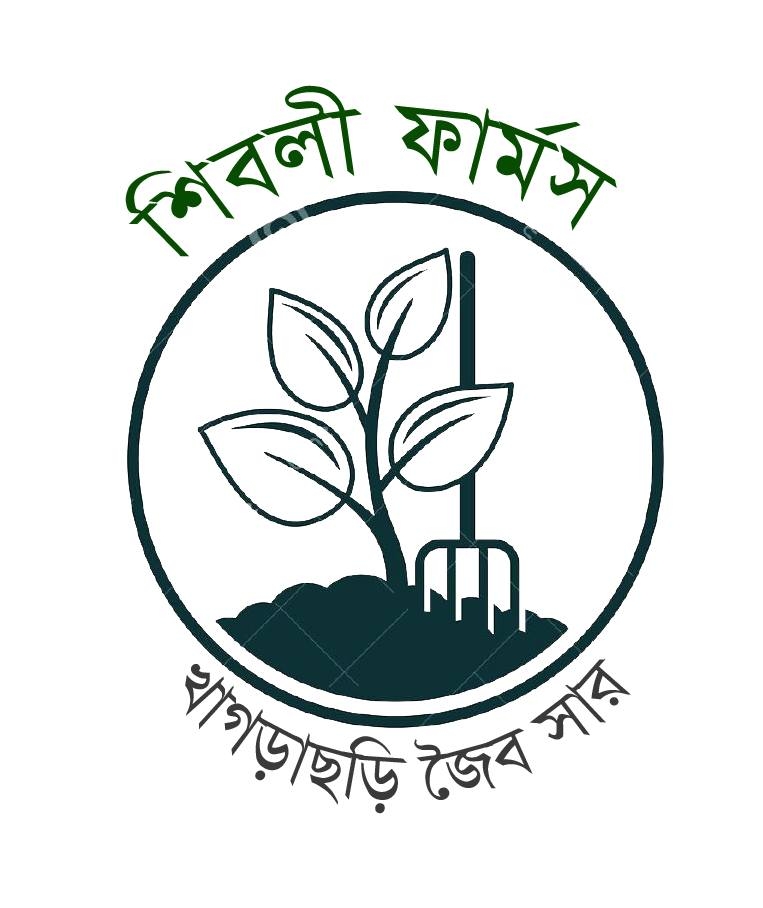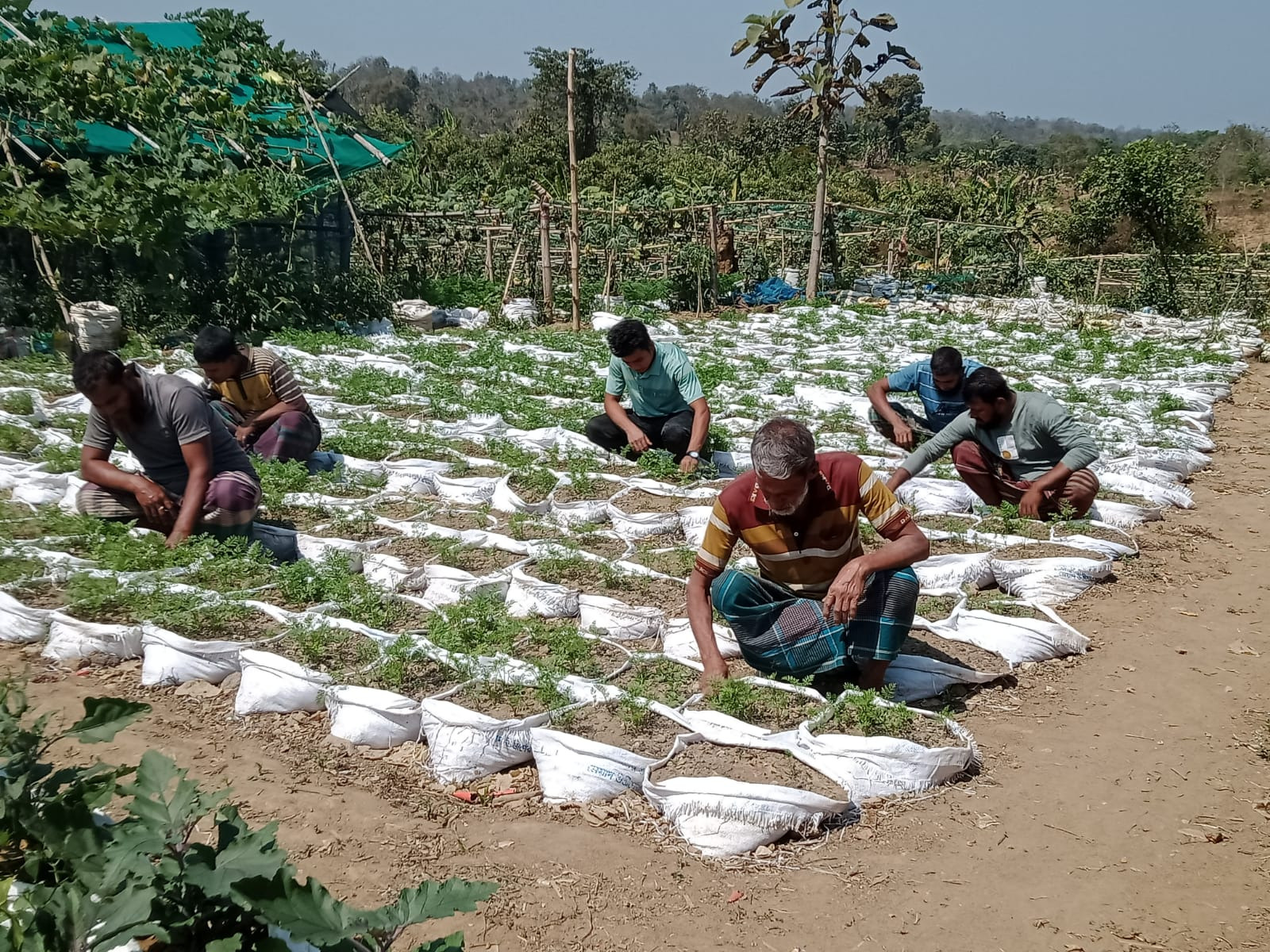১। ভুমিকাঃ শিবলী ফার্মস এর বিদ্যমান কার্যক্রম
খাগড়াছড়ির পানছড়ি উপজেলার ফাতেমা নগর গ্রামে শিবলী ফার্মস ২০২২ সন বা বিগত ৩ বছর যাবত বস্তায় সবজি চাষ করে আসছে। প্রতিষ্ঠান টি মুলতঃ জৈব সার উৎপাদন করে এবং পার্শ্ববর্তি কৃষি খামার সমুহে বা নিকটবর্তী এলাকায় জৈব সার সরবরাহ করে। ৪ বছর আগে, ২০২১ সনে সেই জৈব সার প্রয়োগ করে নিজস্ব খামারে প্রথাগত পদ্ধতিতে সবজি চাষ শুরু করেছিল। কিন্তু অন্যান্যদের মত পাহাড়ি জমিতে সবজি চাষ করতে গিয়ে, মাটির আগাছা পরিস্কার করা, মাটি কুপিয়ে নরম করা ইত্যাদি প্রক্রিয়ায় পাহাড়ের ঢাল এর জমি কে দুর্বল করে ফেলা হচ্ছিল। বর্ষায় সবজি চাষের সেই জমির নরম মাটি বৃষ্টিতে ধুয়ে নিচে ঝর্না বা ছড়াতে চলে যাচ্ছিল। একদিকে ভুমিধ্বস অপরদিকে নীচের ছড়ায় উপর থেকে নেমে আসা ক্ষয়ে যাওয়া মাটি দিয়ে ভরাট হয়ে পানি প্রবাহ আটকে যাচ্ছিল।
এই পরিবেশগত বিপর্যয়ের মুখোমুখি হয়ে প্রতিষ্ঠান টি পাহাড়ের জমিতে স্বল্পমেয়াদী ফসল যেমন সবজি চাষের বিকল্প ও টেকসই পদ্ধতি খুজতে থাকে। এরই এক পর্যায়ে “বস্তায় সবজি চাষ” পদ্ধতিতে নিজস্ব খামারে চাষাবাদ এর কাজ শুরু করে। এই পদ্ধতিতে পাহাড়ের ঢালে সর্বত্র বস্তা স্থাপন করে সবজি চাষ করা যায়। পাহাড়ের ঢালে আগাছার মাঝেই, কোনো রকম মাটি না কুপিয়ে সরাসরি পাহাড়ের অক্ষত মাটির ওপর সারি সারি বস্তা বসিয়ে সেই বস্তায় সবজি চাষ করা হয়। শুরুতে ২০২২ সনে ২,৫০০ বস্তা দিয়ে এই চাষাবাদ শুরু হয়। এই পদ্ধতি লাভজনক হওয়ায় পরের বছর ৫,০০০ বস্তা এবং ৩য় বছর ১১,০০০ বস্তায় এই সবজি চাষ চলমান আছে। গাজর, বিট রুট, মরীচ, বেগুন, করল্লা, লাউ, কুমড়া, এলোভেরা ইত্যাদির চাষ করা হয় শিবলী ফার্মস এর খামারে এই বস্তায় চাষ পদ্ধতিতে।
শুকনা মৌসুমের জন্য সোলার পাম্প বসিয়ে সেচ ব্যবস্থা গড়ে তোলা হয়েছে। বস্তায় সবজি চাষ ব্যয় সাশ্রয়ী; একবার বস্তায় মাটি-জৈব সার দিয়ে বসিয়ে সেখানে অনায়াসে ৩-৪ বার বিভিন্ন সব্জির চাষ করা যায়। আগাছা দমন ও সেচ প্রদান এর কাজ সহজ। সার ইত্যাদি প্রয়োগে অপচয় নেই বললেই চলে। সর্বোপরি, এই পদ্ধতিতে পাহাড়ে চাষাবাদে পাহাড়ের মাটির ক্ষয়, ভুমিধ্বস এর সম্ভাবনা থাকে না। একই ভাবে সার-কীটনাশক ইত্যাদি বৃষ্টির পানিতে ধুয়ে নিচের ছড়া পানি দুষিত করে না।
২। ইসিমোড এর পুরস্কারঃ
২০২৫ এর মার্চ মাসের প্রথম সপ্তাহে নেপাল এর কাঠমান্ডুস্থ ICIMOD - International Centre for Integrated Mountain Development এবং Globa Resilience Partnerhsip (GRP) কর্তৃক শিবলী ফার্মস কে তার বিগত ৩ বছরের এই পাহাড়ি কৃষি কার্যক্রমের আওতায় এই বস্তায় সবজি চাষের স্বীকৃতি স্বরূপ HKH-ICE (Hindu Kush Himalaya Innovation Challenge for Entrepreneurs (HKH-ICE) পুরস্কারে ভুষিত করেছে।
৩। পরবর্তি পরিকল্পনাঃ
শিবলী ফার্মস তার বিগত ৩ বছরের এই পাহাড়ে “বস্তায় সবজি চাষের” অভিজ্ঞতা কাজে লাগিয়ে এখন খাগড়াছড়ি জেলার পানছড়ি উপজেলায় আগ্রহী কৃষক কে দিয়ে এই পদ্ধতিতে সবজি চাষ করাতে চায়।
ইদানিং পানছড়ি উপজেলা পাহাড়ের স্বল্পমেয়াদী কৃষি কাজের অন্যতম ব্যস্ত এলাকায় পরিনত হয়েছে। স্থানীয় অধিবাসীরা সাম্প্রতিক সময়ে ব্যাপক হারে পাহাড়ে কচু, আদা, হলুদ, কাসাভা ও অন্যান্য স্বল্পমেয়াদী কৃষি কাজে নিয়োজিত হয়েছে। প্রতি সিজনে বিপুল পরিমানে এই সকল কৃষিজ পন্য উৎপাদিত হচ্ছে। কিন্তু এর ফলে পাহাড়ের পরিবেশ, বিশেষ করে মাটি ও পানির উৎস সমূহ ব্যাপক ভাবে ক্ষতিগ্রস্থ হচ্ছে। প্রতিবছর বর্ষা কালে পানছড়ি এলাকায় বিভিন্ন পাহাড়ে ভুমিধ্বস এর ঘটনা ঘটছে। তাই প্রাথমিকভাবে এই এলাকার নির্বাচিত চাষি দের নিয়ে শিবলী ফার্মস বস্তায় সবজি চাষের পদ্ধতি টি সম্প্রসারিত করতে আগ্রহী।
---------------------------------------------------------
Shiblee FARMS grows vegetables in the hills of Chittagong Hill Tracts, Bangladesh, in “grow bags” and prevents soil erosion and water pollution.
Growing vegetables or short-term crops in the hills of Bangladesh poses a serious threat to the hill ecology. Farming on the ground requires weeding, pruning, and tilling the soil or applying fertilizers and pesticides. But when the monsoon comes, the soft soil tilled earlier goes down to the stream and fills up the waterways. Also, the chemicals and pesticides get mixed with the water in the stream, making it polluted, bringing things dangerously close to environmental hazards.
Each year, 100s of landslides occur in the 3 hill districts of the Chittagong Hill Tracts in Bangladesh due to putting the hills in danger by growing vegetables this way. We saw everyone engaging in work similarly harmful for the environment and the combined efforts of all were causing the hills, with their thousands of years of ecology, to gradually reach the cusp of destruction. Like others, we, at Shiblee FARMS, started farming vegetables in the hills and faced serious trouble, including land erosion and water pollution.
In short, the existing method of vegetable farming in the hills causes recurrent soil erosion and water pollution, damaging the hill ecology.
We identified a solution for growing vegetables that would not damage the hills. It's not entirely new in the country but pretty much new to the hills. We brought the grow bag solution to our farm based in CHT area. The solution is 'growing vegetables in the grow bags'! In 2022, we started with 2500 grow bags or sacks. In three years, the number of grow bags is 11,000.
The grow bags were placed on the slopes of our hills. We didn’t have to clear weeds as simply placing the sacks on the hill slope did the trick. We use our own organic fertiliser and whatever pesticide or small amount of chemical fertiliser is applied remains in the sacks. This way, the soil was not receding with the rain and the chemicals that mixed with the soil no longer did, not spoiling the water either.
Also, after placing the grow bag once, we could use it again over several cycles. So this has been cost-effective, good for preserving the environment, without the danger of landslides or water pollution. Crucially, we’re able to grow comparatively safer vegetables.
Vegetable farming in the hills in 'grow bag' is a solution that will protect their environment from further degradation and help the community avoid recurrent damages in the hills by developing stronger climate resilience through this method of 'growing vegetables in grow bags'.
In recognition to it's work, Shiblee FARMS has been confirmed as an awardee of HKH-ICE under ICIMOD (International Centre for Integrated Mountain Development) and GRP (Global Resilience Partnership) inititaives in March 2025.
Shiblee FARSM now feels more confident and wishes to help local farmers adapt it's lessons to mitigate the environmental damages.















